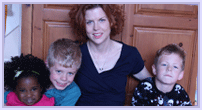Expecting Better: Why the Conventional Pregnancy Wisdom is Wrong-and What You Really Need to Know by Emily Oster
 Expecting Better: Why the Conventional Pregnancy Wisdom is Wrong – and What You Really Need to Know by Emily Oster
Expecting Better: Why the Conventional Pregnancy Wisdom is Wrong – and What You Really Need to Know by Emily Oster
Publisher: Penguin Books
Release Date: June 24, 2014
My rating: 5 of 5 stars
Publisher’s Description:
What to Expect When You’re Expecting meets Freakonomics: an award-winning economist disproves standard recommendations about pregnancy to empower women while they’re expecting. From the author of Cribsheet, a data-driven decision making guide to the early years of parenting
Pregnancy—unquestionably one of the most profound, meaningful experiences of adulthood—can reduce otherwise intelligent women to, well, babies. Pregnant women are told to avoid cold cuts, sushi, alcohol, and coffee without ever being told why these are forbidden. Rules for prenatal testing are similarly unexplained. Moms-to-be desperately want a resource that empowers them to make their own right choices.
When award-winning economist Emily Oster was a mom-to-be herself, she evaluated the data behind the accepted rules of pregnancy, and discovered that most are often misguided and some are just flat-out wrong. Debunking myths and explaining everything from the real effects of caffeine to the surprising dangers of gardening, Expecting Better is the book for every pregnant woman who wants to enjoy a healthy and relaxed pregnancy—and the occasional glass of wine.
When economist Emily Oster became pregnant with her first child, she soon found herself frustrated with the lack of and quality of data behind the pregnancy rules her obstetrician gave her to follow. For example, who decided pregnant women shouldn’t eat deli meat and why? Emily set out to find the answers.
Oster explains in layman’s terms how to interpret study results without talking down to the reader. She addresses things like sample size and correlation versus causality.
I liked that she framed her conclusions in terms of risks verses benefits and recognized that what is an acceptable level of risk for her may not be an acceptable level of risk for the reader and vice versa, for a variety of reasons. It was surprising how many pregnancy don’ts are based on either outdated research or studies with very small sample sizes.
I appreciated Oster’s logical approach to issues that come up in pregnancy and that she didn’t present her conclusions as black and white. She has a new book out called Cribsheet about the early years of parenting that I am very much looking forward to reading as I am due to have my fourth child in a few weeks. My youngest is almost nine so the early years of raising a baby are a distant blur in my memory! I highly recommend Expecting Better for anyone who is pregnant or thinking about becoming pregnant in the future.




